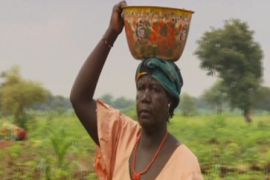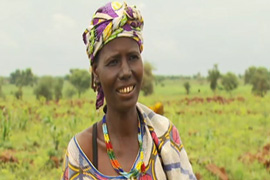Seeds of a self-sustaining future
How one project in drought-ravaged Niger is helping local women to help themselves.

Ten months ago the land around Kadabade, was barren and stony. The deep red soil gave life to very little.
But a local group, supported by the Swiss charity Heks and its larger, better known partner, Christian Aid thought this was the ideal place to launch a project to help locals help themselves.
The first step was to approach the local chief to see if he would been willing to hand over the land. He listened patiently to what they had to say. Amudo Yakubu thought the idea was crazy but interesting. He agreed to hand the land over for nothing, keen to see if anything could be done on such desolate land.
Next a well, or rather, ten of them had to be dug. With pickaxes and spades, they dug down, shifting the soil by hand. They went ten metres down before hitting the water table. Next they had to build the wells that would bring the water to the surface.
Word about what was being planned – a scheme which would help local women to grow food to eat or even sell – got around the local villages. Volunteers came forward.
In the initial stages, the women worked the land; clearing stones, marking out plots, getting things ready for planting. They were paid for their efforts – just over a dollar for a month’s work. Initially there was eight hectares. Now it is 20. This translates into around 120 plots which are 10 metres long and 12 metres wide.
Then as the crops began to grow, the money was phased out. The women were planting peanuts and cabbage, vegetables and ground nuts, mangoes and dates.
Now 125 women work the land in Kadabade.
Purpose and self-respect
 |
| The women grow food to eat and sell |
Amini Sani is one of them. Ten years ago her husband walked out of their home. He never came back. She was left with three children to feed. In Niger’s rural communities, this is a constant struggle.
As she works away, she tells me the project has given her a sense of purpose and self-respect. She tells me: “Before, during the dry season there was nothing to do, just sleep. Now throughout the year, we can work and we are working to produce something for our families. This makes me feel like a new woman.”
Her sense of pride is obvious. And she is keen to tell of us her plans for the future. She has looked around the local markets. She knows what sells and so anything she does not need for her family she sells.
The project has been so successful, there is now a waiting list of more than 200 women and the charities are looking to expand their operation. They have the support of the village elder.
Amudo Yakubu says: “No one could imagine that the women could move all those rocks and make the field green like this. And now those who thought I was crazy to do this want to know how they can set up similar schemes in their villages.”
As we leave, the women sing us the song they use to inspire them to greater efforts in the field, to lift their productivity, as if what they do – turning such barren ground, in such hostile conditions, in continual heat and oppressive humidity – is not hard enough.
In a place where natural difficulties produce a call for aid that is loud and constant, the women of Kadabade show that the thing most of the people here want is simply a chance to help themselves.